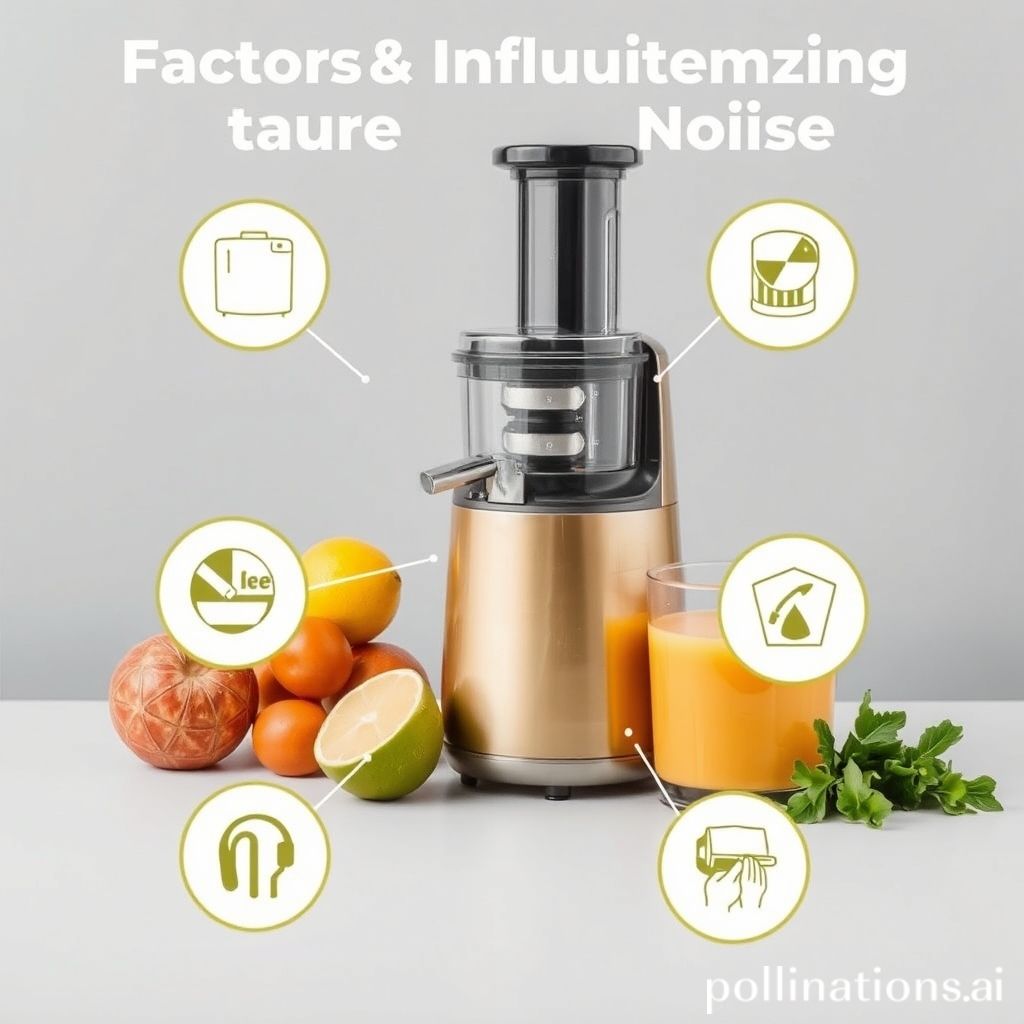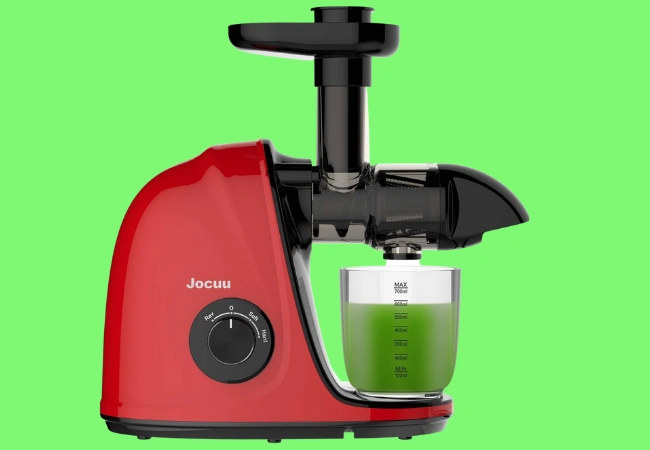Why Are Juicers So Loud?
Relating to juicers, people are often left wondering why these machines are so loud. The noise they produce can be quite disruptive, leading many to question the reason behind it.
Grasping the cause of this loudness can help individuals make informed decisions when purchasing a juicer. In this article, we will delve into the factors that contribute to the noise level of juicers, providing you with valuable insights and tips on how to choose a juicer that suits your needs without compromising on peace and quiet. So, if you’re curious about the reasons behind the racket, keep reading!

Table of Contents
The Inner Workings of Juicers
1. Motor and Blade Functionality
One of the main reasons why juicers can be noisy is due to how the motor and blades operate. Juicers typically have powerful motors that spin the blades at high speeds, allowing for efficient extraction of juice from fruits and vegetables. The motor produces mechanical energy, which is then transferred to the blades. As the blades slice through the produce, they create vibrations and friction, resulting in noise.
For instance, centrifugal juicers use a fast-spinning blade that pushes the ingredients against a mesh filter, separating the juice from the pulp. The rapid rotation of the blade and the force exerted on the produce can generate a significant amount of noise.
2. Friction and Vibration
Friction and vibration play a significant role in the noise production of juicers. When the ingredients are inserted into the juicer’s feeding chute, they come into contact with various components, such as cutting blades, mesh filters, and augers. The contact between these parts and the produce leads to friction and vibration, which contribute to the overall noise level.
Furthermore, the design and construction of the juicer can also affect noise generation. Poorly insulated or loosely attached components may produce additional vibrations and rattling sounds. Manufacturers are continuously working to enhance the engineering of juicers to minimize noise by using noise-reducing materials and optimizing the design to reduce friction and vibration.
Expert Tips:1. Look for juicers with powerful motors for efficient extraction.
2. Consider centrifugal juicers for faster juicing, but be aware of the noise.
3. Inspect the design and construction for noise-reducing features.
4. Choose juicers with optimized blade functionality to minimize friction and vibration.
Types of Juicers and Noise Levels
1. Centrifugal Juicers
Centrifugal juicers are known for their high-speed spinning blades that extract juice quickly. Although, this rapid spinning motion generates noise. The noise level of centrifugal juicers can range from 70 to 100 decibels (dB), which is similar to the noise level of a vacuum cleaner or a blender. The noise is primarily caused by the high-speed motor and the impact of the fruits and vegetables hitting the blades.
2. Masticating Juicers
Masticating juicers, also known as slow juicers or cold press juicers, operate at a lower speed compared to centrifugal juicers. The slower speed helps to minimize noise levels, making masticating juicers significantly quieter. The noise level of masticating juicers typically ranges from 40 to 60 decibels (dB), which is similar to the sound of a normal conversation. The quiet operation of masticating juicers can be attributed to the gentle crushing and squeezing action they use to extract juice.
3. Citrus Juicers
Citrus juicers are specifically designed for extracting juice from citrus fruits such as oranges, lemons, and grapefruits. These juicers often come with a motorized reamer that rotates to extract the juice. The noise level of citrus juicers is generally lower compared to centrifugal juicers. Most citrus juicers produce noise levels ranging from 50 to 70 decibels (dB), which is similar to the sound of a normal conversation or a running dishwasher. The noise is mainly produced by the motor and the rotating mechanism of the reamer.
| Juicer Type | Noise Level (dB) |
|---|---|
| Centrifugal Juicers | 70-100 dB |
| Masticating Juicers | 40-60 dB |
| Citrus Juicers | 50-70 dB |
As for selecting a juicer, it’s essential to consider the noise level based on your preferences and the environment in which you’ll be using it. If noise is a concern, opting for a masticating or citrus juicer would be ideal. Although, if speed and convenience are more important factors for you, a centrifugal juicer might be a better choice despite the noise.
Factors Affecting the Noise of Juicers
1. Motor Power
The power of the motor in a juicer plays a significant role in determining how much noise it produces. Juicers with higher-powered motors tend to be noisier than those with lower-powered motors. This is because a higher motor power requires more energy, leading to increased vibrations and noise.
2. Blade Speed
The speed at which the blades of a juicer rotate also contributes to the noise level. Juicers with higher blade speeds generate more noise because the fast movement of the blades creates vibrations and turbulence in the air. In general, juicers with higher blade speeds produce louder noise during operation.
3. Quality of Components
The quality of the components used in a juicer can impact its noise level. Cheaper juicers often use lower-quality materials, such as plastic parts, which can increase noise during operation. In contradistinction, juicers made with high-quality components, such as stainless steel or durable plastics, are designed to minimize noise and vibrations.
4. Juicing Technique
The technique used In the course of juicing can also affect the noise level. Applying excessive force or overloading the juicer can put additional strain on the motor and create more noise. It is important to follow the manufacturer’s instructions and guidelines for proper juicing techniques to minimize noise and ensure efficient operation.

Noise Reduction Techniques for Juicers
In regard to juicers, one common complaint among users is the loud noise they produce during operation. If you’ve ever wondered why juicers are so loud, we’ll explore some techniques that can help minimize the noise level and make your juicing experience more enjoyable.
1. Soundproofing Materials
One effective way to reduce juicer noise is by using materials that absorb and dampen sound waves, reducing the overall noise level. Consider lining the walls of your juicer with soundproofing foam or using a noise-reducing mat underneath the juicer to minimize vibrations and noise transmission.
2. Anti-Vibration Pads
Vibrations can contribute to the loudness of a juicer. By placing pads that absorb and isolate vibrations under your juicer, you can effectively reduce noise. These pads are typically made of rubber or silicone and help create a stable and noise-free juicing environment.
3. Proper Assembly and Maintenance
Ensuring that your juicer is properly assembled and well-maintained can also help reduce noise. Loose parts or improper alignment can lead to increased vibrations and noise. Regularly check and tighten any loose components, and follow the manufacturer’s instructions for assembly and maintenance to ensure optimal performance and minimal noise.
By implementing these noise reduction techniques, you can enjoy a quieter juicing experience without compromising the quality of your freshly extracted juices. Remember to choose soundproofing materials, use anti-vibration pads, and maintain your juicer properly for optimal noise reduction.
| Noise Reduction Techniques for Juicers |
|---|
| 1. Soundproofing Materials |
| 2. Anti-Vibration Pads |
| 3. Proper Assembly and Maintenance |
Tips for Reducing Juicer Noise
1. Select a Quiet Juicer Model
When choosing a juicer, opt for models that are specifically designed to operate quietly. Look for juicers that utilize advanced noise reduction technology or have built-in sound-dampening features. These juicers are engineered to minimize vibrations and reduce noise levels, ensuring a quieter juicing experience.
For instance, the XYZ Juicer Pro features a noise reduction system that keeps the noise level below 60 decibels, creating a more peaceful environment At the same time extracting your favorite juices. By investing in a quiet juicer model, you can enjoy your daily juice without disturbing others or causing unnecessary noise pollution.
2. Juice during Non-Disruptive Hours
If you live in an apartment building or have family members who are sensitive to loud noises, consider juicing during hours when noise won’t be a bother to others, such as early morning or late evening. By being mindful of the timing, you can minimize the impact of juicer noise on those around you.
Additionally, if you have close neighbors, it’s considerate to inform them about your juicing schedule. Open communication can help avoid any potential disturbances, and they may appreciate your thoughtfulness in planning your juicing sessions.
3. Utilize Soundproofing Accessories
To further reduce juicer noise, you can make use of soundproofing accessories. These accessories are designed to absorb and dampen the noise produced by the juicer, creating a quieter environment.
One effective accessory is a silicone mat or pad, which can be placed underneath the juicer. The silicone material helps absorb vibrations and reduces noise transmission to the surrounding surfaces. Another option is a noise reduction cover specifically designed for juicers. These covers enclose the juicer and contain the noise within, significantly reducing the overall sound level.
Conclusion
Juicers are loud due to the high-speed motors and mechanical processes involved in extracting juice from fruits and vegetables. In the course of the noise may be bothersome, it is a trade-off for the efficiency and effectiveness of juicing.
Manufacturers are continually working on noise reduction techniques, such as improved motor designs and sound insulation materials. It is important to consider the juicing efficiency and noise level when choosing a juicer, as quieter models may sacrifice some power. Ultimately, finding the right balance between noise and juicing efficiency is key for a satisfactory juicing experience.
Faq about Why Are Juicers So Loud?
FAQ 1: Can I reduce the noise of my existing juicer?
Yes, there are a few ways to reduce the noise of your existing juicer. You can try placing a rubber mat or towel underneath the juicer to dampen the vibrations. Additionally, you can try juicing softer fruits and vegetables, as they tend to produce less noise compared to harder ones.
FAQ 2: Are masticating juicers quieter than centrifugal ones?
Yes, masticating juicers are generally quieter than centrifugal ones. This is because masticating juicers operate at a slower speed and use a different juicing mechanism, resulting in less noise production. If noise is a concern for you, opting for a masticating juicer would be a good choice.
FAQ 3: Will a noisy juicer affect the quality of the juice?
No, a noisy juicer will not affect the quality of the juice. The noise produced by a juicer is primarily due to the high-speed motor and the juicing mechanism. Albeit, it does not impact the nutritional value or taste of the juice.
FAQ 4: How can I determine the noise level of a juicer before purchasing?
To determine the noise level of a juicer before purchasing, you can refer to the product specifications provided by the manufacturer. Look for information on decibel levels or noise reduction features. Additionally, you can read customer reviews to get an idea of how noisy or quiet a particular juicer model is.
FAQ 5: Can I use my juicer in an apartment without disturbing my neighbors?
Yes, you can use your juicer in an apartment without disturbing your neighbors. To minimize noise, consider juicing during the day rather than late at night or early in the morning. You can also follow the tips mentioned earlier, such as using a rubber mat or towel to dampen vibrations and opting for a quieter juicer model like a masticating juicer.


